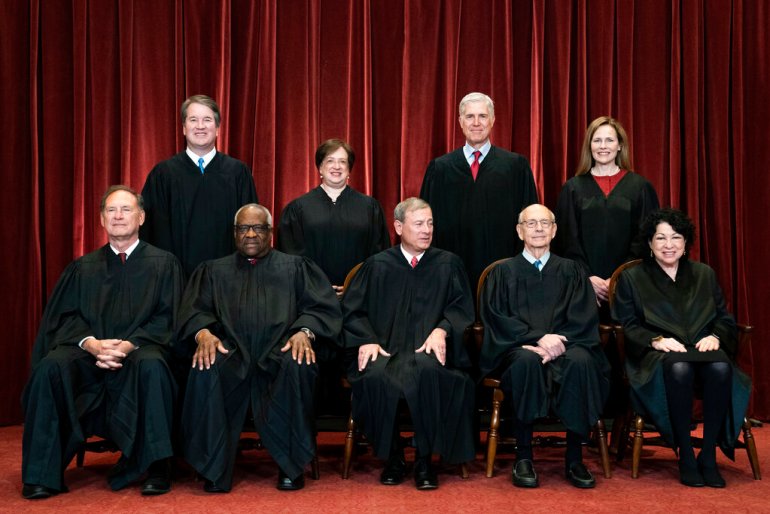US Supreme Court Justice Breyer to retire, giving Biden a pick
Opening could pave the way for the nomination of the first Black woman to the US high court.

United States Supreme Court Justice Stephen Breyer will retire, creating an opening on the nine-member high court, according to US media reports.
The 83-year-old Justice Breyer’s decision to retire gives President Joe Biden an opportunity to appoint a successor who could serve for decades. Biden has pledged to nominate a Black woman to the court, which would be a first in US history.
Keep reading
list of 4 itemsUS Supreme Court hears arguments in Muslim civil rights case
What to expect as US Supreme Court to take up COVID mandate case
Abortion: Will the US Supreme Court overturn Roe v Wade in 2022?
Breyer’s retirement was first reported on Wednesday by NBC News, CNN and The Associated Press, citing unnamed sources. The sources spoke on condition of anonymity so as not to preempt Breyer’s eventual announcement according to the AP.
“There has been no announcement on Justice Breyer, ” Biden told reporters at the White House on Wednesday.
“Let him make whatever statement he wants to make, and I’m happy to talk about it later.”
Breyer’s retirement would be politically significant in the US because there are rising fears among Democrats and liberals that the court – which now has a 6-3 conservative majority – is poised to reverse major US judicial precedents.
Biden’s fellow Democrats hold a razor-thin majority in the Senate, which under the Constitution must confirm Supreme Court nominees. If Republicans were to win back control of the Senate in the November election, that might foreclose Biden’s ability to name a new justice.
“We are so polarised,” Douglas Laycock, a professor of constitutional law at the University of Virginia, told Al Jazeera. “It should mean that the conservative supermajority does not grow … President Biden gets an appointment. So from a balance perspective, 6-3 is better.”
A Biden appointee would not change the court’s ideological balance, but would enable the Democratic president to refresh its liberal wing with a younger jurist in the lifetime post.

Asked about Wednesday’s reports, White House press secretary Jen Psaki did not confirm Breyer’s retirement, telling reporters that any announcement would be up to him.
“The president has stated and reiterated his commitment to nominating a Black woman to the Supreme Court, and certainly stands by that,” Psaki said.
Since joining the court in 1994, Breyer has been a pragmatic force on a court that has grown increasingly conservative in recent years, trying to forge majorities with more moderate justices on the right and left.
Breyer authored important rulings upholding abortion rights and healthcare access, helped advance LGBTQ rights and questioned the constitutionality of the death penalty but often found himself in dissent on a court that has moved rightward.
“His work and his decisions as an Associate Justice on the biggest issues of our time – including voting rights, the environment, women’s reproductive freedom, and most recently, health care and the Affordable Care Act – were hugely consequential,” said Senate Majority Leader Chuck Schumer, who promised immediate action on any Biden nominee.
“President Biden’s nominee will receive a prompt hearing in the Senate Judiciary Committee, and will be considered and confirmed by the full United States Senate with all deliberate speed,” Schumer said.
Potential Biden nominees include Ketanji Brown Jackson, a former Breyer law clerk who was confirmed by the Senate last June to serve on an influential US appellate court, and Leondra Kruger, who serves on the California Supreme Court, according to Reuters.
Sherrilyn Ifill, head of the civil rights group NAACP’s legal operation, has also been touted as a potential Biden nominee.
The court’s present nine-month term began in October and has seen an increasing assertiveness by its conservative majority. Rulings are expected by the end of June that could curtail abortion rights and widen gun rights.
Earlier this week, the justices took up a case to be decided in their next term that could doom university policies considering race in admissions to add more Blacks and Hispanics to their student populations. Conservatives oppose such affirmative action programmes.
Breyer was appointed by President Bill Clinton, a Democrat. Along with the late Justice Ruth Bader Ginsburg, Breyer opted not to step down the last time the Democrats controlled the White House and the Senate – during Barack Obama’s presidency.
Now, liberal activists are eager to avoid a repeat of what happened when Trump was able to replace Ginsburg, expanding the court’s conservative majority.
Ginsburg died in September 2020 allowing then-President Donald Trump to fill her vacancy with a conservative justice, Amy Coney Barrett.
In addition to Barrett, Trump had named conservative jurists Brett Kavanaugh and Neil Gorsuch to the court during his four-year presidency.